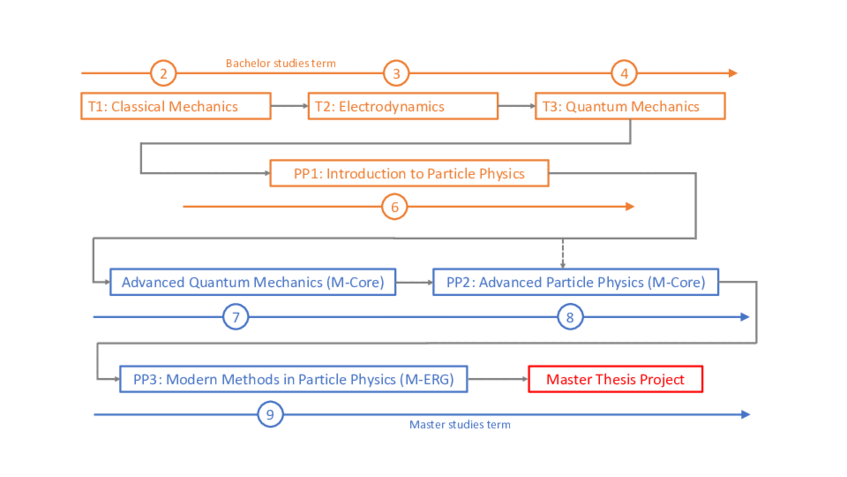How to become a particle physicist?
Is becoming a particle physicist the right thing for me?
Particle physics is the branch of physics dealing with the smallest elements of matter we currently know about. We call these "elementary particles", and therefore particle physics is sometimes also called "elementary particle physics". A particle physicist is someone who studies how these particles exist and interact. Such particles are for example the photon, the electron and the quarks, but also the mysterious Higgs boson, which gives mass to all elementary particles.
A particle physicist is developing and testing theories describing these particles and their interaction. In principle all other physics laws can be derived from such theories. The most successful such theory is called the Standard Model and it describes three of the four known interactions in a coherent fashion.
One of the major testing grounds of these theories in particle physics is the Large Hadron Collider (LHC) at CERN. The LHC is the world’s largest and highest-energy particle collider. Thousands of theoretical and experimental particle physicists work together there to test and explore the Standard Model and to potentially find out about physical effects that are not described by the Standard Model, called "New Physics"
What does a particle physicists do?
First of all there are two kinds of particle physicists: theoretical and experimental particle physicists
Theoretical particle physicists use quantum theory and theories such as the Standard Model to make predictions for observables one may measure in the experiments. Typically such computations are done for the first time in mankind, so they have to be carried out very careful not to do mistakes. Doing such calculations 100% correctly is therefore of highest importance. Because of the complexity of such computations theoretical particle physicists frequently use computers to do the calculations, either numerically or algebraically or by means of Monte Carlo simulation. In addition, theoretical particle physicists also develop new methods for computations and extended or alternative versions of the Standard Model. A theoretical particle physicists also needs to have some good knowledge on experimental particle physics because only questions that can be addressed by an experiment are worth to be explored.
Experimental particle physicists mostly deal with setting up experiments, develop ways to do novel measurements, do the measurements and analyse the data. Dealing with experimental or statistical uncertainties is essential so that the measurements can be interpreted correctly. At a large experiment such as the LHC the experimental work is organised within very large collaborations due to the huge amount of possible measurements and the large amount of data. An experimental particle physicist also needs to have good theoretical knowledge to know which measurements are worth to be realized and how they can be done.
The particle physics group at the University of Vienna is conducting theoretical particle physics. Experimental particle physics is conducted in Vienna at the HEPHY, the SMI and the Atominstitut.
How to become a particle physicist at the University of Vienna?
Apart from mechanics and electrodynamics, one of the theoretical bases of the theories of elementary particle physics is quantum mechanics and in particular quantum field theory. In order to be a particle physicist und must become an expert in these subjects. Quantum field theory is essential because all physical laws governing the interaction and properties of elementary particles follow quantum theoretical laws.
Here is a chart of lectures which are recommended such that you get the education you need to become a particle physicist and to potentially do work in the particle physics group.

Lectures in 2023:
260123 VO Einführung in die Teilchenphysik (2023S)
260057 VO Advanced Particle Physics (2023S)
260064 VO Theoretical Astroparticle Physics (2023S)
Lectures in 2022:
260123 VO Introduction to Particle Physics (2022S)
260043 VO Advanced Quantum Mechanics (2022W)
260057 VO Advanced Particle Physics (2022S)
260048 VU Modern Methods in Particle Physics (2022W)
Lectures in 2021:
260123 VO Introduction to Particle Physics (2021S)
260024 VO Advanced Particle Physics (2021S)
260059 VU Particle Physics: Advanced Concepts (2021S)
Lectures in 2020:
260123 VO Introduction to Particle Physics (2020S)
260043 VO Advanced Quantum Mechanics (2020W)
260062 VU Particle Physics: Standard Model and Phenomenology (2020S)
Lectures in 2019:
260104 VO Quantum mechanics: advancing concepts and applications (2019W)
260105 UE Quantum mechanics: advancing concepts and applications- Exercises (2019W)
260071 VO Advanced Particle Physics
260073 PUE Advanced Particle Physics
